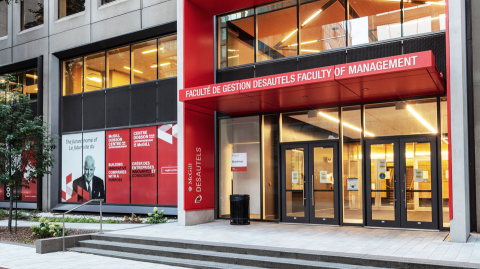McGill announced on Feb. 2 that David Laidley (BCom ’67), chairman emeritus of Deloitte LLP, donated five million dollars to establish the Laidley Centre for Business Ethics, which will be part of the Desautels Faculty of Management. According to Desautels communications manager Leilani Ku, the fledgling centre is in its early stages.
“There are still many elements to be put in place, including the establishment of structure and objectives,” Ku wrote in an email to The McGill Tribune. As of yet, there is no one slotted for the role of director.
Matias Font is a first-year master’s student in business administration (MBA) and vice-president External of Desautels Graduate Student Society (DGSS). He says the donation is especially meaningful coming from inspiring alumni like Laidley because he was the one to acknowledge the lacking business ethics component of management education.
“There was a gap and he’s willing to close that gap. Bringing all that knowledge to us is really important,” Font said.
The Laidley Centre is the first of its kind at McGill, but other Canadian universities began establishing similar centres as early as 1988 when the Clarkson Centre for Business Ethics at the University of Toronto’s Rotman School of Management was founded. Anish Umasuthan, U3 Management and vice-president Internal of the Management Undergraduate Society (MUS), noted that Desautels does not currently devote significant attention to ethics.
“I haven’t had much exposure to [business ethics] as a whole or to the Laidley Centre,” said Umasuthan. “We do integrate sustainability and ethical dilemmas into our classes, but a class that’s solely focused on ethics doesn’t fully exist outside of MGCR 360 [Social Context of Business].”
Unless students voluntarily participate in ethics-related case competitions outside of the classroom, MGCR 360 is the only ethics training required of Desautels undergraduates.
“The professors in MGCR 360 are great,” Umasuthan said. “They definitely make the topics adjustable for […] people who are more quant, [who] are not going to enjoy writing essays or doing readings, which is more arts focussed. But we would benefit from implementing business ethics a little more in some other classes.”
According to Font, the graduate program in business administration also lacks exposure to ethics discourse. Though McGill hosts workshops at the beginning of the year introducing multinational MBA students to ethics in the Canadian cultural and environmental context, the bulk of the instruction derives from external experiences, such as internships.
“We have a good onboarding process, but looking back, I don’t think it should be taught only once or twice,” Font said. “Every semester, every year, we need […] to refresh the idea. Continuous learning is important and would be the next step.”
Font says the Laidley Centre is a welcome development, especially for a generation that is heavily invested in environmental, social, and corporate governance (ESG), as well as equity, diversity, and inclusion (EDI).
“So many students want to have an impact in ESG, they consider EDI, and how we could change things from the inside,” Font said. “The centre […] is for people that are going to be in various positions or even start their own companies. And what’s better than realizing that a person started their company with a social purpose?”
To Umasuthan, business ethics is not an oxymoron. While businesses can be unethical, he believes it can also be used for social good.
“You can make the argument that finance as a whole is destructive, but ultimately we are working in the system that we have, and [change is] going to be incremental,” Umasuthan said. “It’s hard to predict how exactly people will act in the real world once they leave Desautels, but implementing little bits of ethics here and there is helping change the narrative on what business should look like, and what profit-building means to people and to companies.”







